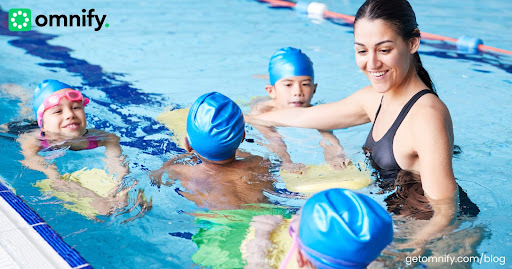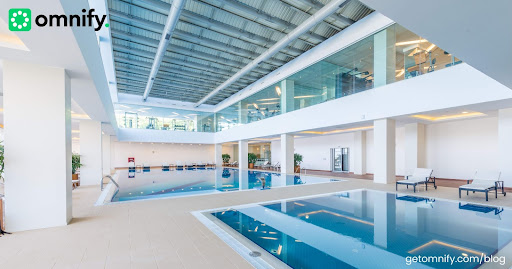Courtesy of Omnify, a SwimSwam partner.
Swim clubs and swim schools form an integral part of the competitive swimming pyramid in America today. Here, young athletes are exposed to the rigors associated with competitive swimming and get to push their limits in a scientific manner by working with experienced instructors.
Now, as much as it is important for swim clubs to watch out for the trends that affect aquatic sports, their growth will be significantly boosted by industry best-practices that are being implemented by the top swim clubs and schools across the country today.
In this article, we will explore the latest best-practices being adopted by swim clubs and swim schools as they seek to expand their programs and attract the best athletes from around the country.
Growing course diversity in swim facilities
There are incredible benefits to swimming regularly, as it is easy on the body and calming to the mind. That’s exactly why swimming classes deserve a lot more attention than so many other forms of exercise and well-being techniques.
But how can you make a real difference as a swim school in your community? The answer lies in a two-pronged approach – smart coaching and a variety of courses.
Those who are passionate about teaching swimming and water safety provide just the right influence. Swim clubs that offer the best coaches and instructors can produce a competent generation of athletes for competitive swimming. More importantly, they would be promoting an active lifestyle, celebrating the spirit of achievement, and encouraging fitness and wellness within their community.
Good instructors are highly equipped with years of valuable experience, so they can efficiently gauge the capabilities of their students and guide them accordingly. A professional instructor can also teach students about the importance of water safety.
A swim club is also perfectly designed to include people from a broad spectrum of economic wealth. Nothing can match the opportunity to become the next Michael Phelps or to learn life-saving techniques in a positive and inclusive environment!
Creating safe spaces for all
Over the last few years, we have seen swim schools grow into increasingly diverse spaces. This makes it more important for swim school and club owners to design pools that facilitate better instruction for all their members. Smart, modern swimming pools should include a blend of features that complement the learning environment and create a more conducive space for everyone.
While swim schools provide safe spaces that invite more people to the pool, the aspect of water safety also comes sharply into focus. Picking up on practices introduced during the pandemic, swim schools can now ensure the highest levels of safety and hygiene at their pools. Today, most swim schools and clubs are adopting UV sanitation, state-of-the-art water treatment, frequent cleaning of filter beds, disinfecting base tracks of swimming pools, and air filtration systems to conform with the safety standards established by the CDC. It is essential to protect swimmers from any contamination from your pools and enable the safest environment for your members without compromising the quality of your service!
Design Intelligence for Relevance
The aim of a swim school facility is to be able to balance the quality of its courses and coaches with a memorable experience. The aspect of pool design here becomes crucial. An intelligent pool design that provides better comfort, advances all kinds of utilization for members of different ages, and enables ease of access will create a more inclusive and comprehensive swim club for all.
Current pool design trends depict how an increase in the diversity of swim classes and programs has been largely borrowing design concepts for more efficient usage of amenities and spaces. Some swim facilities adopt affordable practices, such as adding inflatable structures, bubble balls, flat floats, obstacle courses, and the like to generate more revenue by drawing pool crowds interested in non-competitive swimming.
Here are some contemporary pool designs that could help swim schools and clubs improve their operations and member experience today:
Inground Pool:
Speaking about diversity and accessibility, an in-ground pool design is most convenient for people with all kinds of abilities. An in-ground pool enables access by wheelchair users, unlike an above-ground pool accessed by ladders, making it inconvenient and unsafe.
Lap Pools:
For aquatic facilities that have space constraints, lap pools work fine for all proportions. Even with a rectangular shape, lap pools are designed to accommodate all types of users including fitness enthusiasts, competitive swimmers, and endurance athletes.
Indoor Pools:
So that swimming doesn’t stop even during winters, having an indoor swimming pool helps in facilitating swim training throughout the year. Indoor pools have warm environments – both air and water – thus providing a pretty comfortable environment to continue swimming classes no matter what time of the year.
Zero-depth Entry pools:
Comfortably suited for babies, tots, little ones, and those anxious swimmers, zero-depth pools are for entry-level swimmers. These pools keep safety at the forefront while also letting learners fall in love with water immediately!
Multi-Activity Prowess
Today, aquatic facilities aim to be as multi-functional as possible. An aquatic facility doesn’t have to focus on just classes when the infrastructure could actually host multiple activities outside of its core services. Make your swim school open to promoting both competitive and recreational swimming. You could also set up a hub of low-impact aqua-fit areas catering to parents and tots, kids, family, group exercises, and senior fitness enthusiasts.
Most pool facilities today are focused on finding the most cost-effective ways to integrate aquatic activities including open swim, lap swim, or swim team practices with specialized classes, like Stand-up Paddleboard, Yoga, or pool pilates for swimmers to strengthen themselves for increased mobility and flexibility while swimming.
Swim lessons throughout the year
It is time that swim schools break from the idea of teaching swimming just as a part of the summer season curriculum. Swim facilities can host members around the year using ideal temperature control and heated swimming pools.
Additionally, a swim school that welcomes all even during the winter months can retain swimmers and keep their training going round the year. Swim schools could evolve their business model to create small-ratio classes considering the seasonal plunge and focus more on the member experience part and create greater value for money. Private swim lessons during winters could present a good alternative to the summertime rush when swim facilities are generally overcrowded.
To evoke the interests of swimmers in the winter season, swim schools could also offer special holiday classes. Resetting fitness routines post-holidays surely are more difficult. But the continuation of low-impact swimming lessons surely guarantees fitness and health benefits any time of the year.
As your swim facility adopts these best practices, your team might find itself stretched thin at times. If you would like to make sure your team or club is backed by the right tools to optimize their operations and deliver the highest standards of service, Omnify offers swim schools an all-in-one class scheduling and management solution through an intuitive and easy-to-use platform. To find out how Omnify would work for your operational needs, sign up for a FREE TRIAL and get started today!
This article was first published on getomnify.com. You can read the original post here.
Get in touch with Omnify anytime for a lot more information that has not been covered in this piece. You can also follow them on Facebook, Twitter and LinkedIn.





